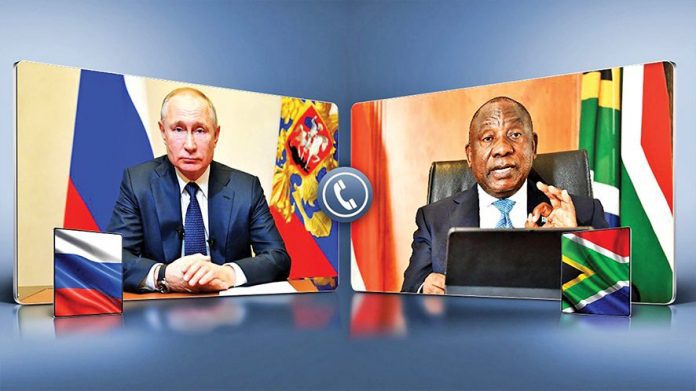South Africa abstained in a vote in the UN General Assembly on the resolution condemning the Russian invasion of Ukraine and demanding its withdrawal.
The government has explained that it enjoys good relations with both Russia and Ukraine, hence its decision.
President Cyril Ramaphosa subsequently said South Africa abstained “because the resolution did not foreground the call for meaningful engagement”.
At home, the DA lost no time in taunting the ANC that its abstention was because a Russian oligarch, Victor Vekselberg, had donated R7.5-million to the ANC. But one cannot assume that he is pro-Putin merely because he is Russian. The reality is that Russia’s billionaires possess their wealth solely by the grace of the Kremlin.
Further, reality has many dimensions. And in this case, history is relevant. To summarise, the ANC remembers who its allies during the Cold War were, and who denounced it as “terrorists”. This has drowned out other considerations. This includes that South Africa, as a small country, depends on the UN charter principles opposing war and invasion to seize territory, and multilateralism to protect it from invasion by a great power. The ANC and the former Soviet Union have a long history together.
After the apartheid regime banned the ANC in 1960, it received aid from the Soviet Union for its exiled mission in the fight to liberate South Africa from white minority rule. This aid exceeded that from the pan-African Organisation of African Unity – now the African Union – or anyone else.
It was only from the end of the 1970s that Scandinavian donations became higher than Soviet funding but that remained limited to peaceful aid.
Only the Soviet Union provided weapons and other military aid to the ANC’s armed wing, Umkhonto weSizwe.
Historical links such as these were evident in the divide between African states during the UN General Assembly vote to condemn Russia’s invasion of Ukraine.
Namibia, which is governed by Swapo; Angola, ruled by the MPLA; and Mozambique, which is governed by Frelimo, joined SA in abstaining.
Swapo, the MPLA and Frelimo also received Soviet foreign aid during the Cold War when they too were liberation movements fighting guerrilla wars.
By contrast, Botswana and Zambia voted to condemn the Russian invasion. Significantly, their governing parties came to power peacefully and did not have Russian alliances. This vote for the UN resolution condemning the Russian invasion and demanding its withdrawal was also the position of 28 African Union members.
Clearly, the liberation movements of Angola, SA, Namibia and Mozambique regard Russia as the inheritor and custodian of the Soviet Union history and traditions.
There is some irony in this, as so often in history. While President Vladimir Putin started his career in the Soviet KGB, the political police, he now merits the Western saying that there is no one more anti-communist than an ex-communist.
Today’s Kremlin ensures that the Communist Party of the Russian Federation faces rigged elections, cheating it of winning the vote in Vladivostok and other towns.
Why, then, do the ANC, Swapo, MPLA, Frelimo and the SACP – the ANC’s governing alliance partner – continue to retain such bonds of deference to Putin’s anti-communist government? One reason could be that Russia and those southern African governments have shared resentment of the international dominance of Nato, especially that of the US and former colonial powers the UK and France.
The relationship between SA and the US, especially, has a complex history, not least because US governments designated ANC leaders fighting the apartheid regime as terrorists. There is also a memory of the Central Intelligence Agency’s unsavoury role in Africa.
Most of the anti-Ukrainian commentary in SA reflects the commentators’ stance against previous US government foreign policy of wars in Iraq,
Afghanistan and elsewhere. It doesn’t reflect facts unfolding on the ground.
For the governments of South Africa, Namibia, Angola and Mozambique, the historical alliances and enemies of last century’s Cold War seem destined to tip the scales when it comes to their voting at the UN, the AU and in other forums. This is despite the fact that, as small countries with severely constrained defence capabilities, they depend on the support for multilateralism and the UN system against any invasions by a great power.
- Keith Gottschalk is a political scientist at the University of the Western Cape. He is also an ANC member but wrote this article in his professional capacity as a political scientist. This article first appeared on The Conversation.
By Keith Gottschalk
Follow @SundayWorldZA on Twitter and @sundayworldza on Instagram, or like our Facebook Page, Sunday World, by clicking here for the latest breaking news in South Africa. To Subscribe to Sunday World, click here.





